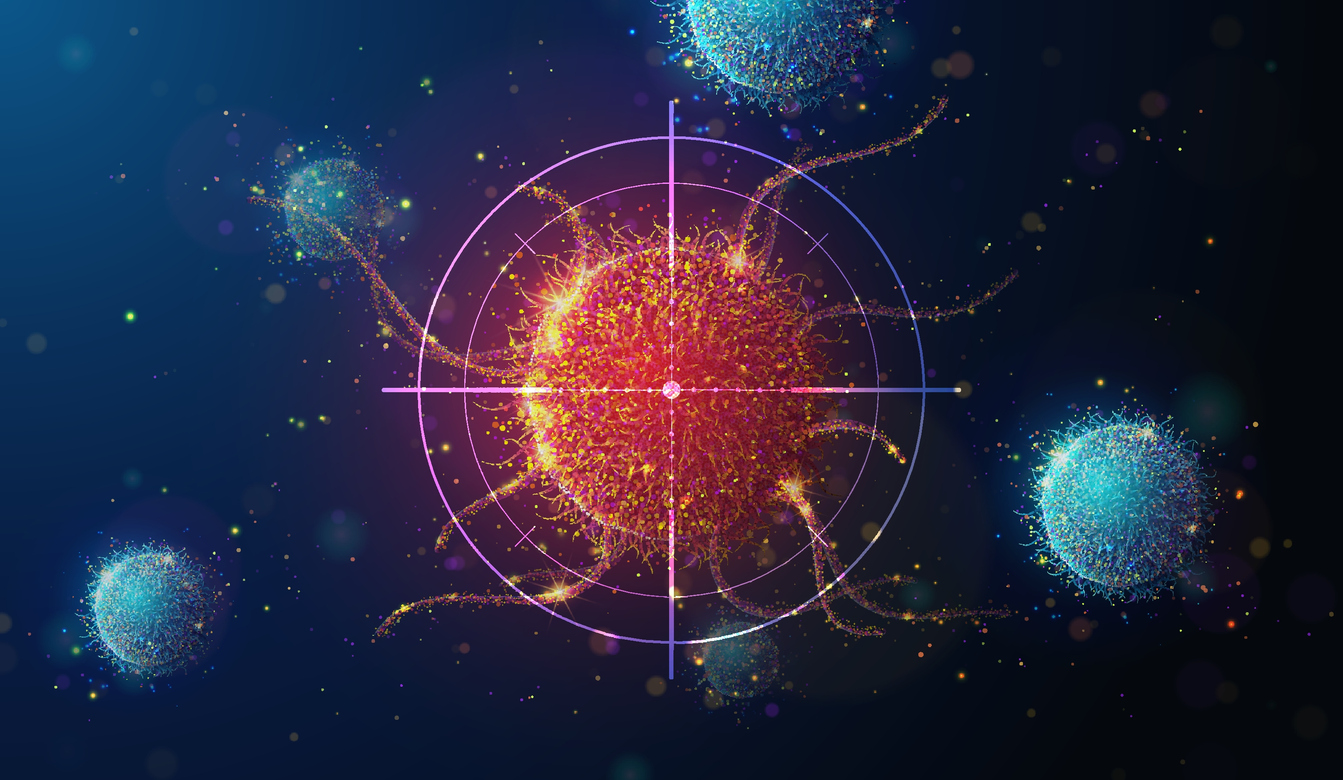2025-02-03
CD47: The Tumor Shield Finally Broken?
Oncology
#cancer #immunotherapy #CD47 #innovation
Cancer remains one of the leading causes of mortality worldwide. And conventional treatments, such as surgery, chemotherapy, and radiotherapy, are often ineffective against advanced, metastatic, or resistant cancers. Immunotherapy, which uses the immune system to target cancer cells, represents a major breakthrough, particularly for cancers that are difficult to treat.
One of the most promising discoveries in this field is the understanding of the role of the CD47 protein, a molecule overexpressed on the surface of many cancer cells. It acts as a molecular shield by inhibiting phagocytosis, a key process in identifying and destroying abnormal cells. Tumors are able to evade the immune system, thus ensuring their growth and spread throughout the body.
This characteristic makes CD47 a major therapeutic target. By blocking its interaction with its immune receptor (SIRPα) located on macrophages, it is possible to reactivate their anti-tumor capacity. Interest in this pathway has led to intense research activity aimed at translating these discoveries into clinically exploitable therapies for a wide range of cancers.
CD47-targeted therapies have shown a promising ability to enhance tumor cell phagocytosis. Anti-tumor immunity is strengthened, particularly when these therapies are combined with immune checkpoint inhibitors (PD-1/PD-L1). These therapeutic combinations amplify immune responses and improve treatment outcomes.
However, their deployment remains limited by several challenges. Hematologic toxicities, due to CD47 expression on healthy cells such as red blood cells, lead to side effects such as anemia. Moreover, therapeutic resistance is a significant barrier. Some tumor cells develop alternative immune evasion mechanisms. Finally, the production of these treatments is complex, expensive, and technically demanding, limiting their large-scale accessibility.
This study aimed to evaluate the efficacy of anti-CD47 therapies, their mechanisms of action, and the challenges that hinder their widespread application. It highlights encouraging results in terms of tumor phagocytosis and anti-tumor immunity, particularly in combined therapies.
However, significant obstacles remain, including hematologic toxicities due to CD47 expression on healthy cells, therapeutic resistance of tumors, and the complexity of producing these treatments. These limitations reduce accessibility and require optimization to maximize their effectiveness and safety.
The future of these therapies depends on several research directions: developing predictive biomarkers to better target patients, exploring alternative formulations such as bispecific antibodies, combining anti-CD47 therapies with other immunotherapies, and better managing side effects. With further research and rigorous clinical trials, these approaches could permanently transform the oncology landscape and offer new solutions to patients with advanced cancers.
Cancer remains one of the leading causes of mortality worldwide. And conventional treatments, such as surgery, chemotherapy, and radiotherapy, are often ineffective against advanced, metastatic, or resistant cancers. Immunotherapy, which uses the immune system to target cancer cells, represents a major breakthrough, particularly for cancers that are difficult to treat.
One of the most promising discoveries in this field is the understanding of the role of the CD47 protein, a molecule overexpressed on the surface of many cancer cells. It acts as a molecular shield by inhibiting phagocytosis, a key process in identifying and destroying abnormal cells. Tumors are able to evade the immune system, thus ensuring their growth and spread throughout the body.
This characteristic makes CD47 a major therapeutic target. By blocking its interaction with its immune receptor (SIRPα) located on macrophages, it is possible to reactivate their anti-tumor capacity. Interest in this pathway has led to intense research activity aimed at translating these discoveries into clinically exploitable therapies for a wide range of cancers.
Read next: Immunotherapy and Ovarian Cancer: Toward Enhanced Treatment Response?
CD47: The Key to Boosting Anti-Cancer Immunity?
This study examined various innovative approaches to blocking the interaction between CD47 and its SIRPα receptor. Among the strategies studied, monoclonal antibodies such as magrolimab were evaluated for their ability to restore macrophage activity against tumor cells. Other therapies, like CD47-targeting CAR-T cells and bispecific antibodies combining CD47 with immunostimulatory molecules, were also examined. These approaches were assessed through trials evaluating their anti-tumor efficacy, safety, and potential to overcome resistance in advanced cancers.CD47-targeted therapies have shown a promising ability to enhance tumor cell phagocytosis. Anti-tumor immunity is strengthened, particularly when these therapies are combined with immune checkpoint inhibitors (PD-1/PD-L1). These therapeutic combinations amplify immune responses and improve treatment outcomes.
However, their deployment remains limited by several challenges. Hematologic toxicities, due to CD47 expression on healthy cells such as red blood cells, lead to side effects such as anemia. Moreover, therapeutic resistance is a significant barrier. Some tumor cells develop alternative immune evasion mechanisms. Finally, the production of these treatments is complex, expensive, and technically demanding, limiting their large-scale accessibility.
CD47: A Revolution in the Fight Against Cancer?
Cancer remains one of the leading causes of mortality worldwide, with traditional treatments often inadequate in dealing with advanced, metastatic, or resistant cancers. These limitations emphasize the urgent need for innovative approaches that can overcome tumor immune evasion mechanisms. CD47-targeted therapies represent a promising strategy by exploiting the immune system's ability to recognize and eliminate cancer cells.This study aimed to evaluate the efficacy of anti-CD47 therapies, their mechanisms of action, and the challenges that hinder their widespread application. It highlights encouraging results in terms of tumor phagocytosis and anti-tumor immunity, particularly in combined therapies.
However, significant obstacles remain, including hematologic toxicities due to CD47 expression on healthy cells, therapeutic resistance of tumors, and the complexity of producing these treatments. These limitations reduce accessibility and require optimization to maximize their effectiveness and safety.
The future of these therapies depends on several research directions: developing predictive biomarkers to better target patients, exploring alternative formulations such as bispecific antibodies, combining anti-CD47 therapies with other immunotherapies, and better managing side effects. With further research and rigorous clinical trials, these approaches could permanently transform the oncology landscape and offer new solutions to patients with advanced cancers.
Read next: Transplantation and Cancer: A Life-Saving Duo?

Last press reviews
Birch allergy: could one shot change everything?

#AllergicRhinoconjunctivitis #IgG4 #Allergoid #BirchPollen #Immunotherap...
Allergies: could the gut hold the key?

#SeasonalAllergicRhinitis #Probiotics #Prebiotics #GutMicrobiota...
Parkinson’s disease: bone health shouldn’t be overlooked

#ParkinsonsDisease #Osteoporosis #FractureRisk #FRAX #Prevention...